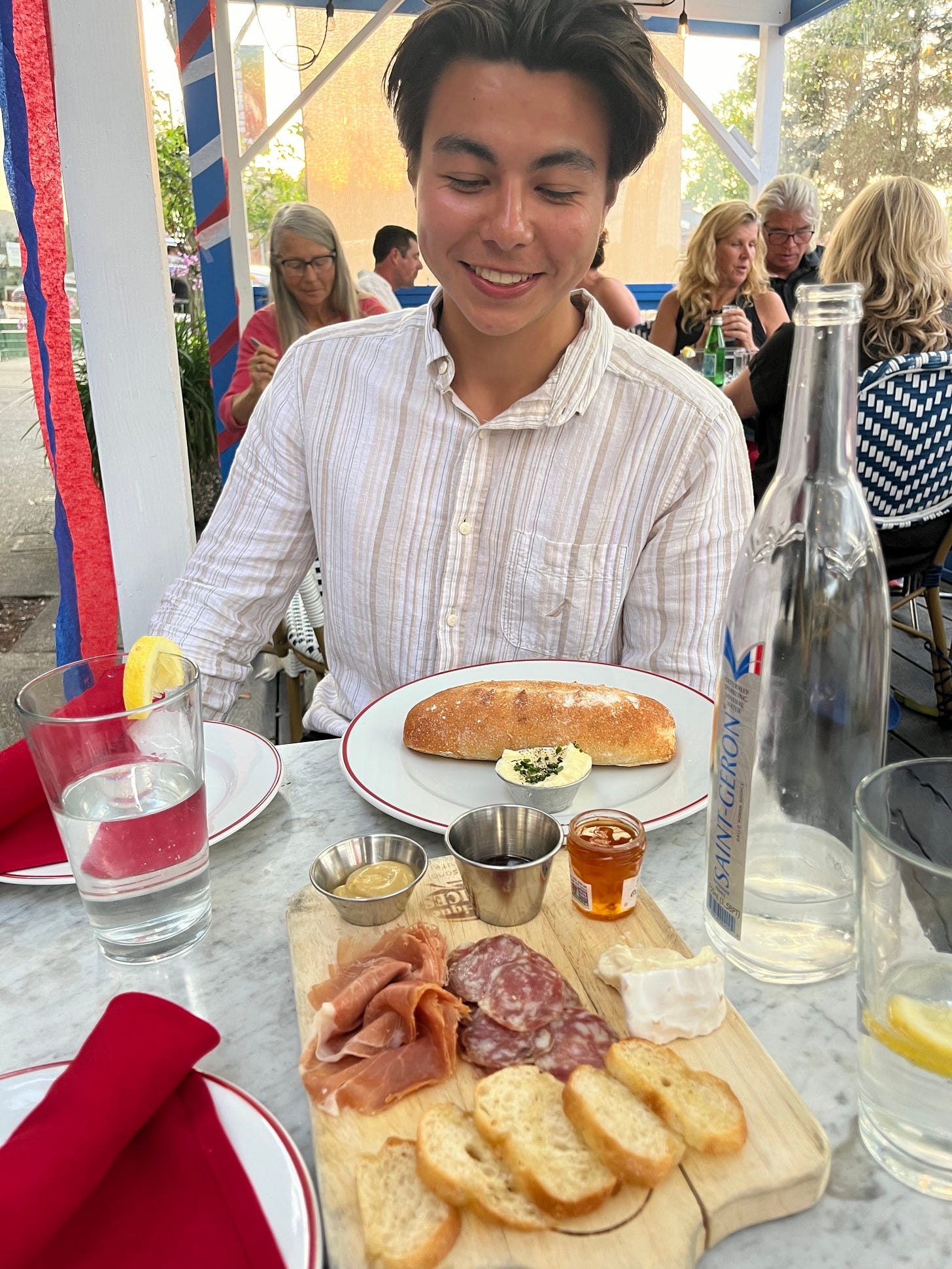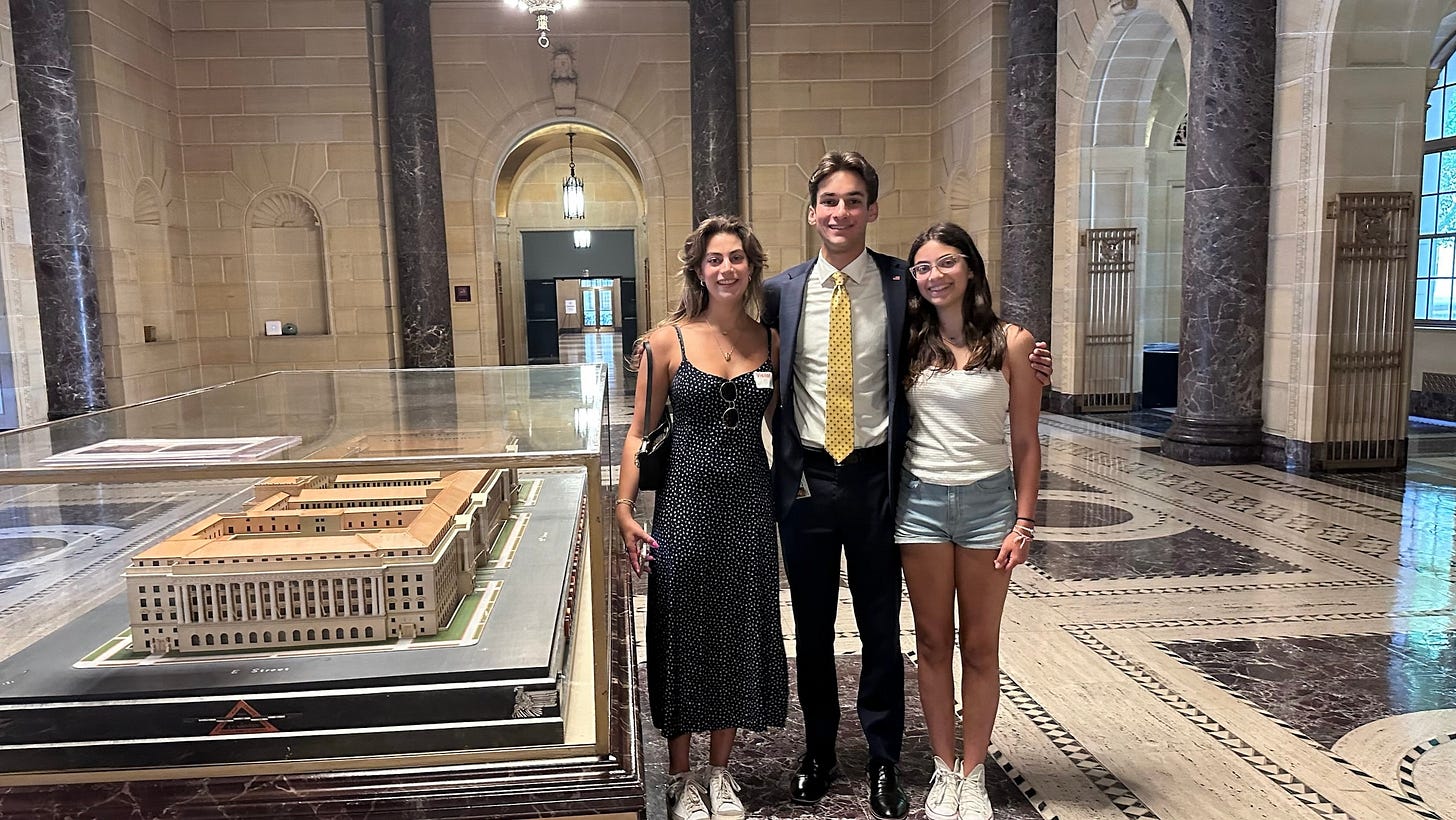Work-Life Balance
Jeremi makes much-needed progress on his project; Luca recounts a week full of interesting events and interested people
Welcome back to Jeremi and Luca’s Newsletter, a weekly update brought to you by two friends on opposite ends of the country, connected by a relentless desire to learn.
The topics may seem random and disjointed (they are), but would it be fun otherwise? Either way, we promise each issue will be filled with insights, learnings, and updates, in what we hope is a good way to stay connected to friends and family.
In this ninth installment, enjoy Jeremi’s takeaways from trusting the process, and Luca’s recount of a week full of interesting events, interested people, and family.
Jeremi: Computer Code and Charcuterie
I’ve finally broken through a wall with my project at Lawrence Livermore.
For the last two weeks I had been stuck, making little progress on this project. I had a bug that was causing my code not to work, and despite my best efforts, I felt that I was throwing spaghetti against a wall (with a suspicious lack of stickiness).
But through those two weeks, I felt like I was getting closer. I was redefining false assumptions I had about the technology I was using, and getting a clearer understanding of what the heck was going on underneath the hood.
When I started, I had the high-level idea that I was going to connect a database to a distributed query engine. But what does that actually look like? When a file with data is uploaded, it’s not just ready for analysis. As I learned, I needed to set up multiple databases, with a specialized service for managing metadata, just so the query engine knew what it was looking for.
Even if there was no external progress, I had to trust the process. I was learning what I didn’t know, and it gave me confidence that I would eventually figure out what was causing my code not to work.
In the end, it was one word in my code that made a difference (which is how it always is). But that one word required me to understand the protocols that two databases were using. I scavenged documentation and internal configuration files to understand that these protocols weren’t consistent, and I needed to change one of them.
If I had known the answer from the beginning, those two weeks of work could’ve been compressed into two days. But that would betray the depth of understanding I’ve gained from this struggle.
It’s cliche to remark how finding an answer to something is much better than being told the answer. Still, it was striking to see it play out so visually: where a few lines of code gave me a depth of learning precisely because of the journey I had taken to write them.
***
I also wanted to do a quick appreciation post for my friend Jacob. He has supported me this summer as I navigate life, pushing me with tough conversations and always being a source of a good laugh.
As I’ve recently learned, he also has a great eye for restaurants to try. We celebrated Bastille Day at one of the best French-American restaurants I’ve eaten at, which will now certainly become a frequent destination.
Luca: National Security and Family
A personal mantra that has consistently guided my view of others is, “an interesting person is an interested person.” Put simply, the people I find most compelling are those who are genuinely curious about the world.
Jeremi and I learned long ago, perhaps at a Stanford robotics conference in middle school, that attending high-quality events is a great way to meet these people; this is a commodity that D.C. certainly does not lack.
This week, on the recommendation of a Berkeley public policy professor, I attended events at The Brookings Institution and the Center for Strategic and International Studies (CSIS), two well-established think tanks that host near-daily events.
At CSIS, Robin Niblett, former director of Chatham House and current geopolitical risk advisor, spoke about his latest book on U.S.—China relations: “The New Cold War: How the Contest Between the US and China Will Shape Our Century”
To illustrate the “interconnectedness” he argues distinguishes this “new cold war” from that of the 20th century, he explained that the recent high-altitude balloon from China carried surveillance technology developed in the United States. Adding to the irony, the F-22 that shot down the balloon contained Chinese microelectronics.
At Brookings, two panels discussed advanced technologies and their impact on manufacturing. They highlighted that China has more robots per manufacturing worker and at least three times the manufacturing capacity compared to the U.S. This capacity, whether it’s currently being used for defense or consumer goods, would be vital in any potential conflict.
Technological advancements are essential for achieving and maintaining both economic and security advantages. Yet, this “new cold war” involves a delicate balance of pulling apart to focus on national interests while avoiding complete severance from the deeply intertwined relationship with China.
Both talks featured distinguished speakers and topical discussions. But above all, they were attended by curious people eager to learn. Interesting people are interested people, and in Washington, I love that I can find them everywhere.
***
On a separate note, I was also super fortunate to have my mom and two sisters visit me this week. It was great to see them and show them around the city.
Highlights included giving them a tour of the U.S. Department of Commerce, walking the National Mall, visiting the Holocaust Museum and Library of Congress, and getting to view the House and Senate chambers. Oh, and the food.







Jeremi, Your struggle to access the problem and find the solution on your own is Golden! You were able to tolerate a high level of frustration and pain in the process—good for you. Look at the resilience and strength you have cultivated. You will remember this for the rest of your life and it will always be a source of strength, determination, and confidence—born from hard-won personal experience.
Your reporting is consistently engaging and accessible. Thank you for sharing your discoveries in a manner that is comprehensible to us non-scientific beings!